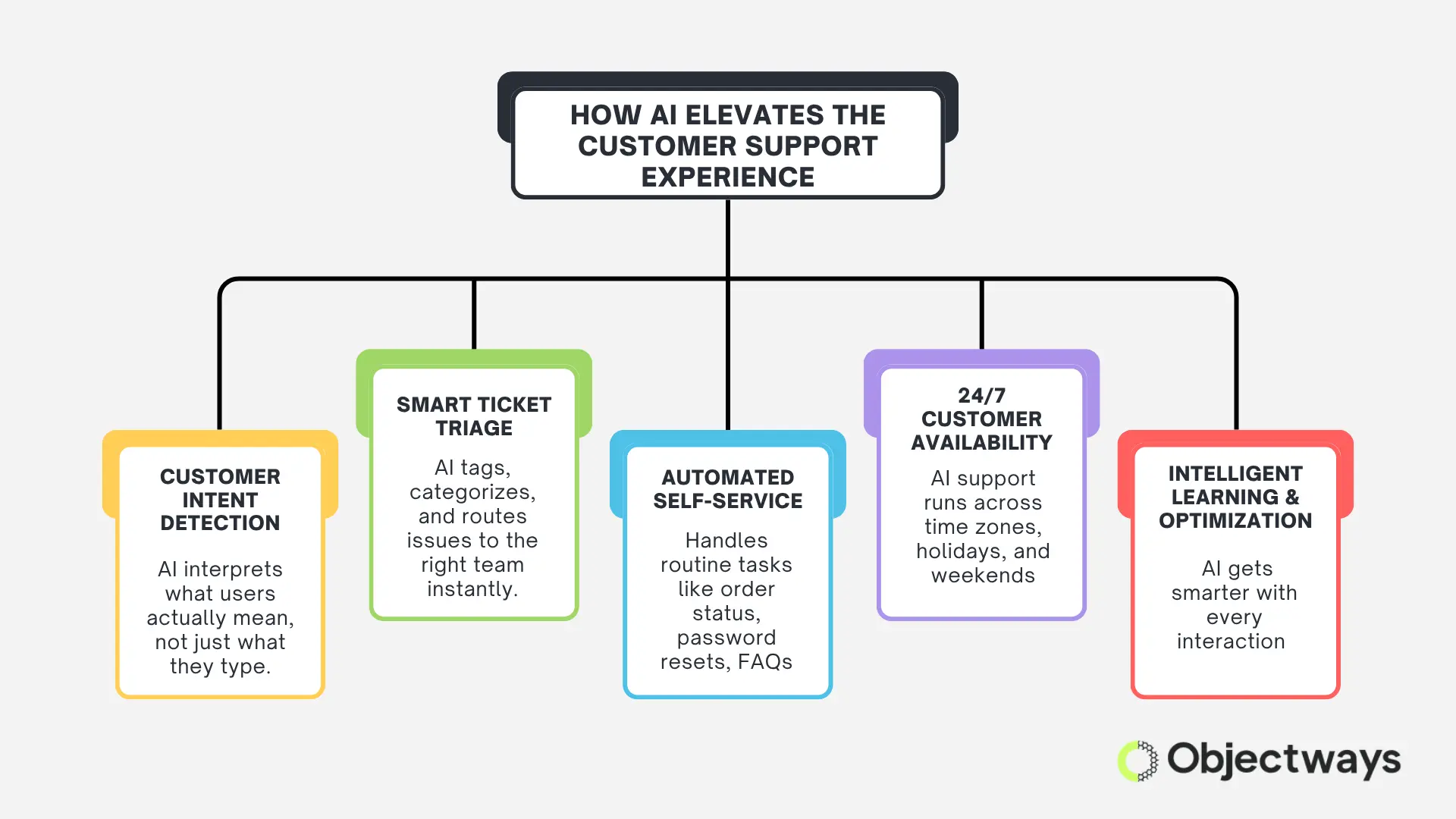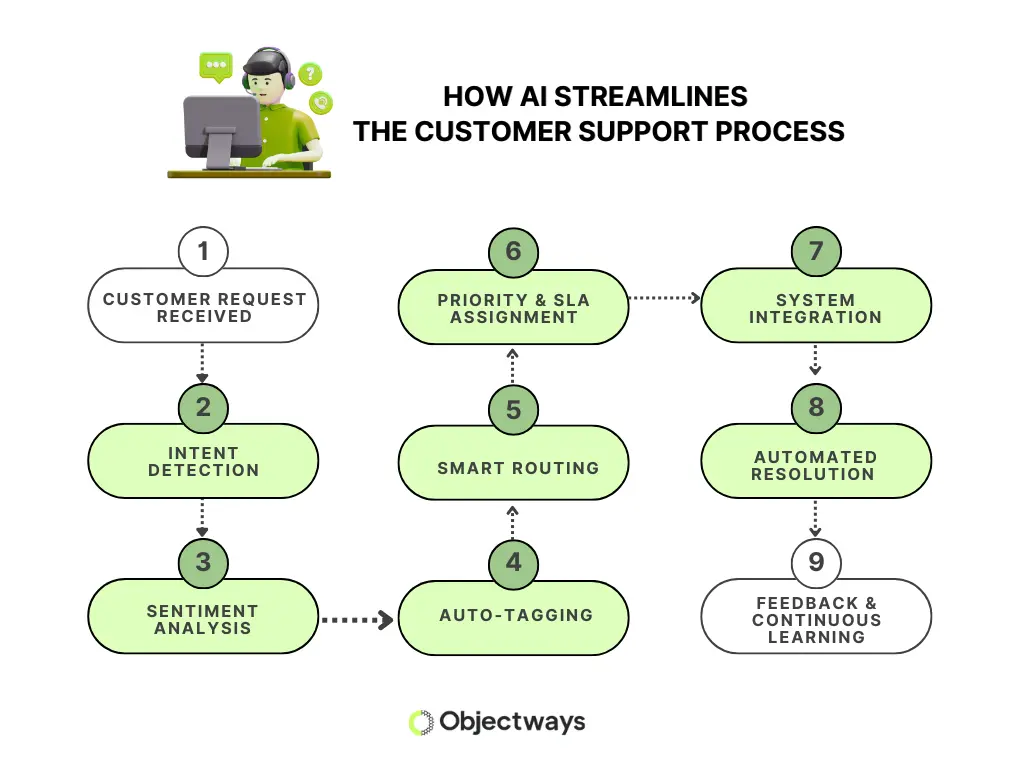Nearly 90% of customers want a reply the moment they ask for help. To meet that level of urgency, many businesses are using AI helpdesks, self-service systems, and automated workflows.
On one hand, customers expect quick and accurate answers whenever they reach out for support. Having to wait too long, repeating the same issue, or receiving confusing responses often leads to frustration. On the other hand, support teams are facing growing pressure as more people reach out through various channels at all hours.
Artificial intelligence can step in and make it easier for support teams to keep up as more customers reach out. For instance, chatbots can understand everyday questions, and automated FAQ (frequently asked questions) pages can help people find answers quickly.
These AI-driven customer service automation solutions lead to faster replies and a more consistent support experience overall. Another direct result of implementing such solutions is that it reduces the load on human agents and makes it possible for teams to focus on more complex problems that need personal attention.
In this article, we will explore how customer service automation can help support teams work more efficiently and provide customers with quicker, more reliable assistance. Let’s get started!
Many commercial websites have an FAQ page, but not all of them give customers the answers they need. Outdated information, hard-to-find answers, or vague explanations can end up causing more confusion than actually providing solutions.
FAQ automation goes beyond a basic list of questions and answers. It uses AI-powered tools like chatbots and virtual assistants to provide quick, relevant responses to customer inquiries. A well-optimized FAQ page, combined with automation, is easy to navigate, kept up to date, and designed to deliver exactly what customers need. When done right, this system becomes the first place customers turn to for help.
This is crucial because most people try to solve problems independently before reaching out to support teams. Around 81% of customers would rather find an answer themselves than wait for a representative to get back to them.
AI plays a key role in making FAQ automation more interactive and responsive. Instead of scrolling through a huge list of questions, customers can simply ask their query. Using Natural Language Processing (NLP), AI models understand customer questions, even when phrased differently or with typos.

AI is a critical part of FAQ automation.
Rather than just matching keywords, AI comprehends the intent behind the query and instantly provides the most relevant answers. As AI learns from interactions, it becomes faster and more accurate, offering 24/7 support and improving the overall customer experience.
Another interesting example of AI in action is Sephora’s use of AI-powered tools to enhance the customer experience. Their Sephora Virtual Artist chatbot enables shoppers to find products, check availability, and receive personalized beauty advice. This tool reduces repetitive questions and quickly guides customers to the right products, making shopping faster and easier. Customers can explore products and try them virtually without needing to speak to a human, which makes the process more efficient and enjoyable.
As customer expectations grow, AI allows businesses to keep up without sacrificing quality. It handles simple tasks, freeing up support teams to focus on more complex issues.
Here’s a closer look at how AI improves customer service:

How AI Elevates the Customer Support Experience
Automation in customer service doesn’t have to mean losing a personal touch. It’s about making things quicker, easier, and still feeling tailored to the customer. Vodafone’s chatbot, TOBi, is a great example of this. It handles around 1 million conversations daily across multiple channels like the app, web, WhatsApp, and voice.
TOBi manages everything from basic questions to troubleshooting. When something more complex comes up, it seamlessly passes the conversation to a human agent. This provides a smooth and personal experience.

Vodafone’s Chatbot Assisting a Customer. (Source)
Agoda’s automated chat system works similarly. It lets customers handle simple tasks like booking cancellations or changes without needing to contact an agent. With easy verification through booking ID and email, it’s faster and more convenient for customers. By giving people the tools to resolve issues on their own, Agoda reduces the load on agents while still offering personal help when customers need it.
So far, we’ve discussed the questions that customers have and the general support tasks that seem obvious. However, there’s a lot more going on behind the scenes. It’s not as straightforward as it seems.
AI can handle many of these critical but not obvious tasks, improving internal processes and keeping everything running smoothly. By taking over routine tasks, AI adds structure, speeds up response times, and frees up teams to focus on the more complex issues that truly need human input.
For instance, Autodesk, a global software company that creates tools for design and engineering, uses this approach with its virtual agent, AVA. AVA manages nearly 1 million licensing and account-related requests every year, reducing the backlog and giving agents more time to handle cases that require more attention.
Here are some other ways automation benefits support operations:

AI automates support workflows end-to-end, boosting consistency and service quality.
Some customer questions are simple and frequently asked, like checking an order status, resetting a password, or inquiring about store hours. AI is a great fit for these tasks because it can provide quick answers anytime without needing a break.
Not every problem is simple, though. Sometimes a customer is upset, confused, or facing a billing issue. In these situations, a real person is the better choice. Humans can ask follow-up questions, show empathy, and adapt based on the customer’s needs and emotions. Ultimately, the best customer support systems do both. AI takes care of the simple requests, so human agents can focus on the ones that need more personal attention.

An AI-driven support model that escalates complex issues to humans.
Let’s say you’re managing a customer support team at a manufacturing company, and you want to integrate AI to improve your processes. You can start by selecting the right tools and partners. The tools should easily fit into your current systems and understand customer questions, not just match keywords. For example, when a customer asks about the status of their order, AI can pull up the relevant information instantly, without requiring human involvement.
Your team should also be able to update FAQs or any common issues without relying on technical staff, keeping the information accurate. Likewise, integration is key. The AI system should work seamlessly with your helpdesk, CRM, and other tools, so agents can access a complete customer history, like past orders, maintenance requests, or billing issues, all in one place.
The details involved in implementing such a system can be challenging. Partnering with experts like Objectways can make a real difference.
At Objectways, we specialize in creating custom AI solutions that fit your business needs, helping to ensure smooth integration and ongoing improvements to your support processes. We work alongside you to make sure everything runs as efficiently as possible, so your team can focus on what matters most.
Support teams today are facing more pressure than ever, with higher expectations and increasing demand across all channels. AI can help by handling the routine tasks, speeding up response times, and giving agents more time to focus on what really matters.
An impactful AI system starts with high-quality data. High-quality data is the foundation for an effective AI system. With the right data, AI can provide more accurate insights, improve decision-making, and deliver a seamless customer experience.
Ready to take your support to the next level? Reach out to Objectways and let’s make it happen.
